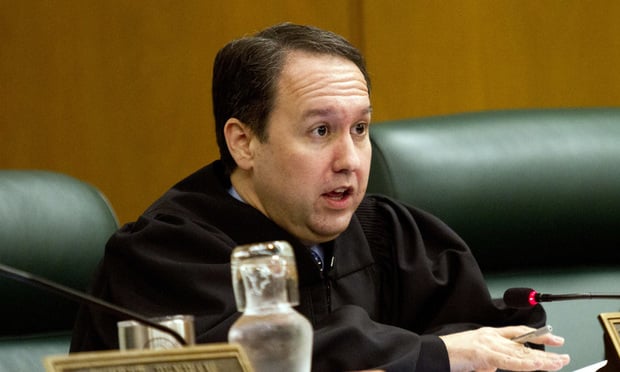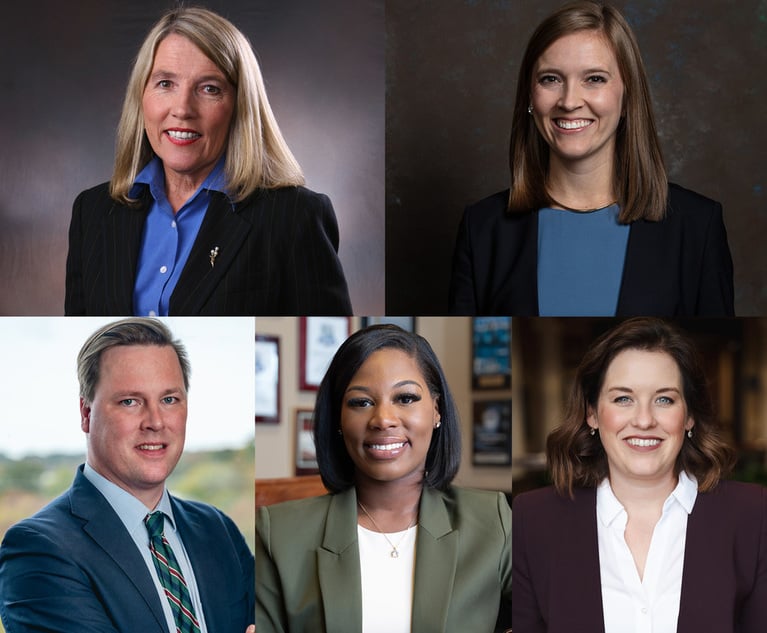Litigation Funding Company Survives Payday Lending Lawsuit
“Like the Court of Appeals, we conclude that neither the Industrial Loan Act nor the Payday Lending Act applies to the transactions at issue in this case,” Georgia Supreme Court Justice Keith Blackwell said
October 23, 2018 at 11:10 AM
3 minute read
 Justice Keith Blackwell, Supreme Court of Georgia (Photo: John Disney/ALM)
Justice Keith Blackwell, Supreme Court of Georgia (Photo: John Disney/ALM)
The Georgia Supreme Court blocked a lawsuit against a litigation funding company Monday, ruling that such transactions can't be governed by lending laws because they're not really loans.
The difference is that plaintiffs in personal injury lawsuits don't have to pay the money back if they don't recover a judgment or a settlement, Justice Keith Blackwell said in the unanimous opinion. And they don't have to pay back more than they recover. So, instead of loans, these payments amount to high-risk investments—with matching rates of return.
The decision upheld the Georgia Court of Appeals, which overruled a trial judge who considered litigation funding to be high-interest lending.
“Like the Court of Appeals, we conclude that neither the Industrial Loan Act nor the Payday Lending Act applies to the transactions at issue in this case,” Blackwell said. “Accordingly, we affirm the judgment of the Court of Appeals.”
During oral arguments in May, appellate attorney J. Darren Summerville of the Summerville Firm told the high court that Cherokee Funding and other companies that advance cash to personal injury litigants are part of a “monstrous industry.”
Summerville represents Ronald Ruth, Kimberly Oglesby and a potential class of others in the same situation. They were hurt in car crashes and needed money while they waited for their claims to be settled. They hired a lawyer who had them sign powers of attorney, used to enter into agreements with Cherokee Funding. Ruth and Oglesby claimed in their lawsuit that they never saw the agreement or had it explained to them.
Ruth received $5,300 for living expenses until his claim settled, after which Cherokee demanded $84,000, according to the lawsuit. Oglesby received $400. When her claim was paid, her lawyer deducted $1,000 to repay Cherokee. Ruth and Oglesby said Cherokee charged a “monthly use fee” of 4.99 percent and compounded that and other add-ons for an annual rate of 80 percent. “It's illegal, because it's too high an interest rate,” Summerville argued in May.
“We are obviously disappointed with the result, Summerville said by email following Monday's opinion. “A court should grant a motion to dismiss—or affirm that treatment—only when under no set of facts may a plaintiff bring a meritorious claim.” He added the court didn't seem to be saying that.
Laurie Webb Daniel of Holland & Knight handled the appeal for Cherokee Funding. She told the high court during oral arguments that litigation cash advances are not loans at all, because they carry no guarantee of repayment. If the claim fails to bring a settlement, Cherokee cannot collect. Instead, she said, the arrangements are high-risk investments that carry a return “due to the inherent uncertainty of litigation.”
On Monday following the decision, Daniel said by email, “The starting point when construing a statute must be its text and, as the Court stressed, we must presume the legislature 'meant what it said and said what it meant.'”
The case is Ruth v. Cherokee Funding, No. S17G2021.
This content has been archived. It is available through our partners, LexisNexis® and Bloomberg Law.
To view this content, please continue to their sites.
Not a Lexis Subscriber?
Subscribe Now
Not a Bloomberg Law Subscriber?
Subscribe Now
NOT FOR REPRINT
© 2025 ALM Global, LLC, All Rights Reserved. Request academic re-use from www.copyright.com. All other uses, submit a request to [email protected]. For more information visit Asset & Logo Licensing.
You Might Like
View All


Plaintiffs Attorneys Awarded $113K on $1 Judgment in Noise Ordinance Dispute
4 minute read
'Didn't Notice Patient Wasn't Breathing': $13.7M Verdict Against Anesthesiologists
12 minute readTrending Stories
- 1Government Attorneys Face Reassignment, Rescinded Job Offers in First Days of Trump Administration
- 2Disney Legal Chief Sees Pay Surge 36%
- 3Legaltech Rundown: Consilio Launches Legal Privilege Review Tool, Luminance Opens North American Offices, and More
- 4Buchalter Hires Longtime Sheppard Mullin Real Estate Partner as Practice Chair
- 5A.I. Depositions: Court Reporters Are Watching Texas Case
Who Got The Work
J. Brugh Lower of Gibbons has entered an appearance for industrial equipment supplier Devco Corporation in a pending trademark infringement lawsuit. The suit, accusing the defendant of selling knock-off Graco products, was filed Dec. 18 in New Jersey District Court by Rivkin Radler on behalf of Graco Inc. and Graco Minnesota. The case, assigned to U.S. District Judge Zahid N. Quraishi, is 3:24-cv-11294, Graco Inc. et al v. Devco Corporation.
Who Got The Work
Rebecca Maller-Stein and Kent A. Yalowitz of Arnold & Porter Kaye Scholer have entered their appearances for Hanaco Venture Capital and its executives, Lior Prosor and David Frankel, in a pending securities lawsuit. The action, filed on Dec. 24 in New York Southern District Court by Zell, Aron & Co. on behalf of Goldeneye Advisors, accuses the defendants of negligently and fraudulently managing the plaintiff's $1 million investment. The case, assigned to U.S. District Judge Vernon S. Broderick, is 1:24-cv-09918, Goldeneye Advisors, LLC v. Hanaco Venture Capital, Ltd. et al.
Who Got The Work
Attorneys from A&O Shearman has stepped in as defense counsel for Toronto-Dominion Bank and other defendants in a pending securities class action. The suit, filed Dec. 11 in New York Southern District Court by Bleichmar Fonti & Auld, accuses the defendants of concealing the bank's 'pervasive' deficiencies in regards to its compliance with the Bank Secrecy Act and the quality of its anti-money laundering controls. The case, assigned to U.S. District Judge Arun Subramanian, is 1:24-cv-09445, Gonzalez v. The Toronto-Dominion Bank et al.
Who Got The Work
Crown Castle International, a Pennsylvania company providing shared communications infrastructure, has turned to Luke D. Wolf of Gordon Rees Scully Mansukhani to fend off a pending breach-of-contract lawsuit. The court action, filed Nov. 25 in Michigan Eastern District Court by Hooper Hathaway PC on behalf of The Town Residences LLC, accuses Crown Castle of failing to transfer approximately $30,000 in utility payments from T-Mobile in breach of a roof-top lease and assignment agreement. The case, assigned to U.S. District Judge Susan K. Declercq, is 2:24-cv-13131, The Town Residences LLC v. T-Mobile US, Inc. et al.
Who Got The Work
Wilfred P. Coronato and Daniel M. Schwartz of McCarter & English have stepped in as defense counsel to Electrolux Home Products Inc. in a pending product liability lawsuit. The court action, filed Nov. 26 in New York Eastern District Court by Poulos Lopiccolo PC and Nagel Rice LLP on behalf of David Stern, alleges that the defendant's refrigerators’ drawers and shelving repeatedly break and fall apart within months after purchase. The case, assigned to U.S. District Judge Joan M. Azrack, is 2:24-cv-08204, Stern v. Electrolux Home Products, Inc.
Featured Firms
Law Offices of Gary Martin Hays & Associates, P.C.
(470) 294-1674
Law Offices of Mark E. Salomone
(857) 444-6468
Smith & Hassler
(713) 739-1250






